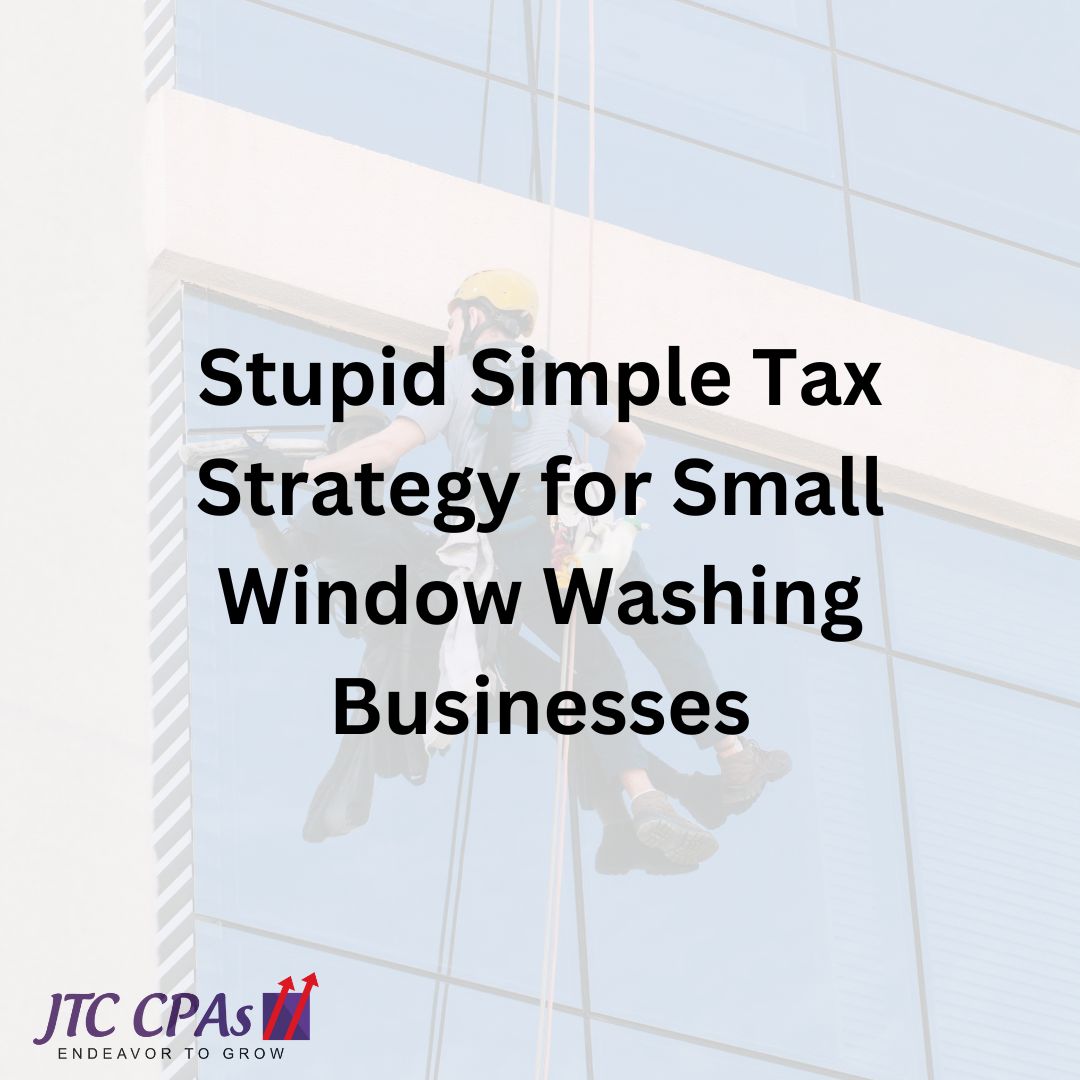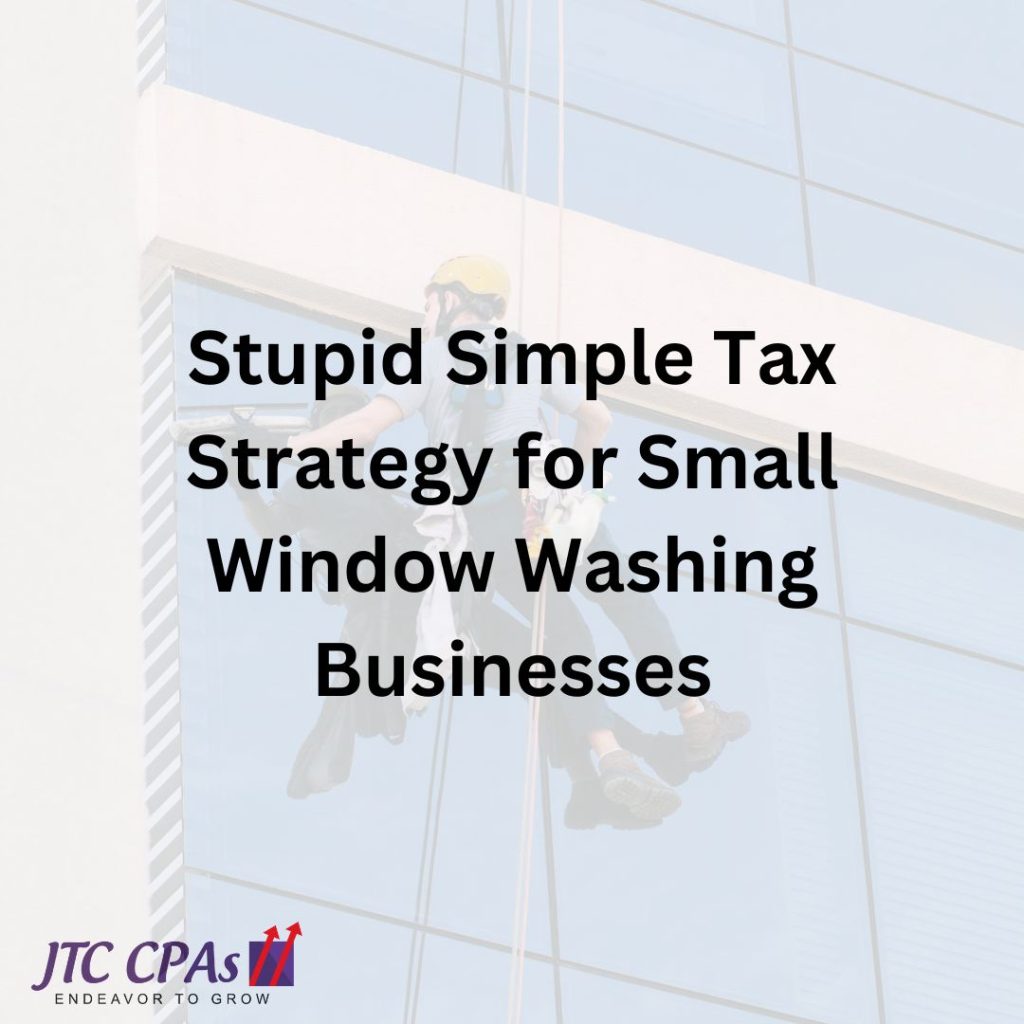
Published November 29, 2023 – Hello, fellow entrepreneurs and small business enthusiasts! Today, we’re diving into a topic that might not be the most glamorous but is undeniably crucial for the success of your small window washing business—tax planning. Now, I know what you might be thinking, “Taxes? Really?” But bear with me, because understanding the ins and outs of tax planning can be a game-changer for your venture.
Table of Contents
Introduction
Key Tax Considerations
Lower Threshold for the Qualified Business Income Deduction (QBI)
Tax Credits for Retirement Plans
Instant Asset Write-Off Extended and Increased
State-Level Compliance Strategies
Registration Requirements in Florida
Practical Tips for Small Business Owners
Introduction
Picture this: you’re diligently scaling up your window washing business, reaching new heights with each squeaky-clean pane. Amid the hustle and bustle, it’s easy to overlook the importance of tax planning. However, here’s the reality check – navigating the world of taxes is not just about filling out forms and crunching numbers; it’s about ensuring the financial health and sustainability of your business.
Now, let’s zoom in on state-level tax implications. Many small business owners underestimate the impact of state taxes on their bottom line. Each state has its own set of rules and regulations, and if you’re not in the loop, it could lead to unnecessary financial headaches. From sales taxes to income taxes, the landscape can be a bit daunting. But fear not! This is where strategic tax planning comes into play.
We get it – tax codes can be as clear as a muddy puddle, but that’s why we’re here to help you wade through the complexities. Compliance strategies are not just a bureaucratic necessity; they are your roadmap to financial success. Ensuring that your business is in line with state tax laws not only keeps you out of trouble with the taxman but also opens up opportunities for deductions and credits that could save you money.
Think of tax planning as a proactive measure, a shield that protects your hard-earned profits. By understanding the unique tax landscape for small window washing businesses in your state, you empower yourself to make informed financial decisions. It’s not about avoiding taxes; it’s about optimizing them to fuel the growth of your business.
So, whether you’re just starting or you’ve been in the game for a while, join us on this tax-planning journey. Together, we’ll demystify the world of small business taxes, making sure your window washing enterprise not only sparkles on the surface but thrives financially beneath it. Stay tuned for practical tips, expert insights, and success stories that will elevate your business to new heights!
Key Tax Considerations
Lower Threshold for the Qualified Business Income Deduction (QBI)
In the ever-evolving landscape of tax regulations, small window washing businesses find themselves on the cusp of a notable change—the lowered threshold for the Qualified Business Income Deduction (QBI). What does this mean for you? Well, in simple terms, it translates to more opportunities for tax savings. The QBI deduction is designed to benefit small businesses, and with the threshold lowered, you could be eligible for significant deductions on your taxable income.
Imagine the impact on your bottom line. More dollars saved means more resources to invest back into your window washing enterprise. It’s not just about reducing your tax burden; it’s about fostering financial growth and sustainability.
Tax Credits for Retirement Plans
As business owners, we wear many hats, one of which involves the well-being of our team. This is where the importance of tax credits for retirement plans comes into play. By offering effective retirement planning options, not only do you enhance the financial security of your employees, but you also unlock valuable tax credits for your business. It’s a win-win scenario—loyal and motivated employees plus potential tax savings.
Retirement plan contributions not only benefit your team in the long run but also position your window washing business as an employer of choice. In the competitive landscape of small businesses, attracting and retaining top talent is a game-changer.
Instant Asset Write-Off Extended and Increased
Good news for window washing entrepreneurs— the instant asset write-off has been not only extended but also increased. This means that when you invest in essential equipment for your window cleaning operations, you can write off the entire cost instantly. It’s a golden opportunity to upgrade your tools, invest in technology, or even expand your fleet without the typical long-term depreciation schedule.
Leverage this extended and increased instant asset write-off to not only enhance your operational efficiency but also to reap the rewards of immediate tax benefits. Your business can thrive, and your financial investments can yield quicker returns.
State-Level Compliance Strategies
Navigating the complex web of state-specific tax laws can be a challenge, but it’s a challenge we’re here to help you tackle. Understanding the nuances of state-level compliance is crucial for small window washing businesses. From sales tax rates to income tax brackets, each state has its own set of rules.
Common challenges include deciphering state-specific deductions and credits, staying on top of filing deadlines, and ensuring accurate record-keeping. But fear not, because we’ll guide you through effective compliance strategies, helping you avoid pitfalls and capitalize on opportunities unique to your state.
Registration Requirements in Florida
If you’re operating a window washing business in the Sunshine State, understanding Florida’s registration requirements is paramount. The Department of Revenue has specific guidelines for businesses offering nonresidential cleaning services, and compliance is key to a seamless operation.
We’ll walk you through the steps of registration, ensuring that your business is in good standing with the state. From filling out the necessary forms to understanding any associated fees, we’ve got you covered. By meeting these registration requirements, you not only comply with the law but also set the stage for a thriving window washing enterprise in Florida.
Practical Tips for Small Business Owners
Running a successful window washing business involves more than just delivering streak-free views; it requires a keen understanding of the financial landscape, especially when it comes to taxes. Here are some practical tips in a handy list format to help you navigate the complexities of small business taxation:
- Keep Accurate Records: Accurate record-keeping is the cornerstone of effective tax management. Ensure you maintain detailed financial records, including income, expenses, receipts, and invoices. This not only facilitates smooth tax preparation but also provides a clear snapshot of your business’s financial health.
- Leverage Available Tax Credits: Don’t leave money on the table—identify and leverage available tax credits. From QBI deductions to credits for energy-efficient equipment, understanding and utilizing these opportunities can significantly reduce your tax liability. Stay informed about credits applicable to your window washing business, and maximize your savings.
- Stay Informed About Changes: The tax landscape is dynamic, with laws and regulations evolving. Stay ahead of the curve by regularly updating your knowledge on tax law changes. Subscribe to reliable tax resources, attend seminars, and keep an eye on announcements from relevant authorities. Being proactive in understanding changes ensures you’re not caught off guard during tax season.
- Seek Professional Advice: While you may be a window washing expert, navigating the intricate world of taxes is a different ballgame. Consider seeking professional advice from tax experts or consultants. Their insights can help you optimize deductions, ensure compliance with the latest regulations, and provide strategic financial guidance. Investing in professional advice often pays off in the form of minimized tax liabilities and enhanced financial planning.
